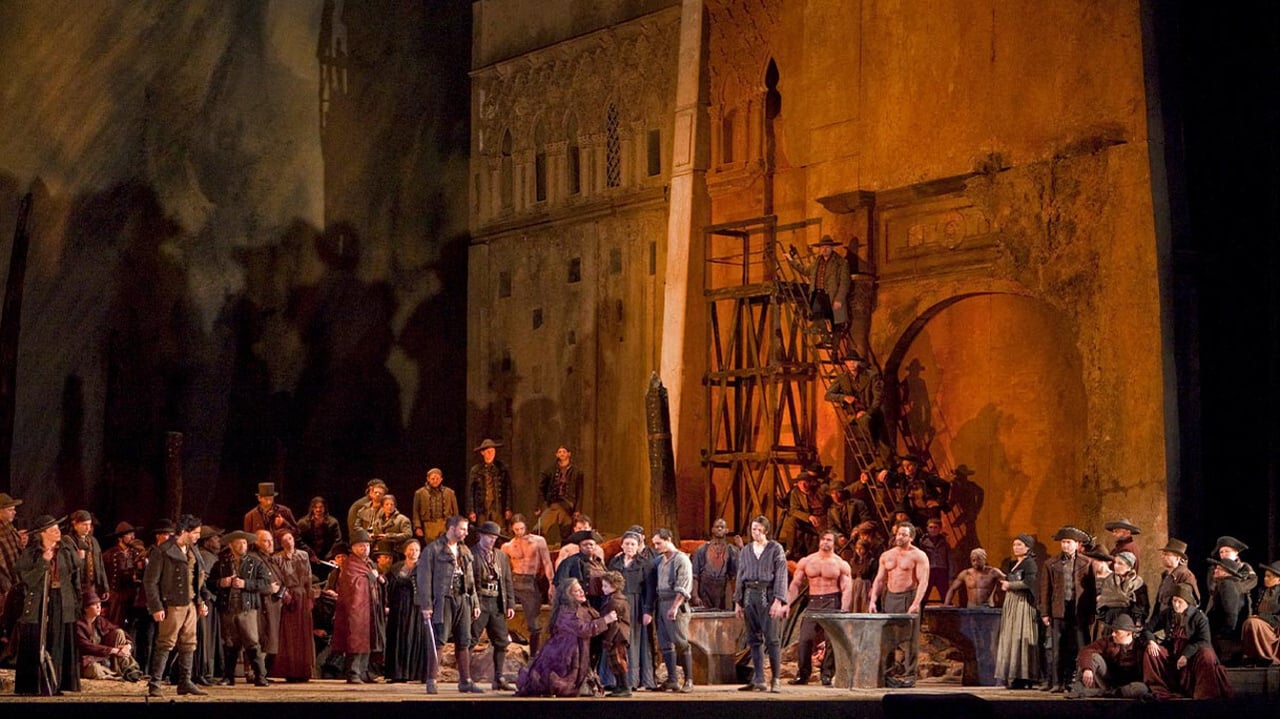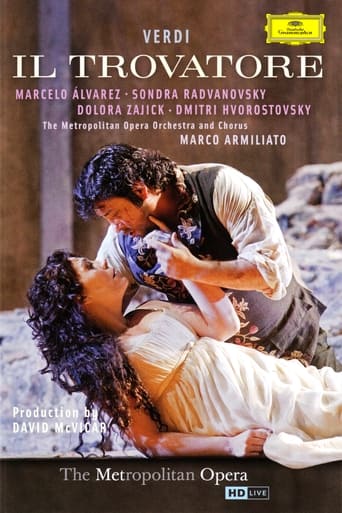Huievest
Instead, you get a movie that's enjoyable enough, but leaves you feeling like it could have been much, much more.
Bob Taylor
I've now seen Marcelo Alvarez in two productions of this opera: the first from Parma in 2010, and this one from the Met in 2011. The Met performance is far superior to the one from Parma in every way. The Met Leonora is far better than the no-name soprano from Parma, the Count is leagues ahead, the Azucena is the superb Dolora Zajick. I can't improve on the reviews of the two previous users, so will just finish by saying what a tremendous loss to the opera world was the death of Dmitri Hvorostovsky, whose Count di Luna is one of the great performances by a baritone I've ever heard.
Gyran
Il Trovatore has a plot that sounds as though it has been adapted from the Jerry Springer Show, particularly the absent-minded Gypsy who throws the wrong baby on the fire. It is quite elliptical, you have to work out yourself some of what has happened. The most crucial part of the plot, the burning of the Gypsy and the disappearance of the young boy are related twice, Rashomon-like, first by officer of the guard Ferrando and then by the Gypsy Azucena. Ferrando's racist portrayal of Gypsies bewitching and stealing babies is contradicted in Azucena's account. We see the Gypsies during the famous anvil chorus. They are portrayed as honest, hardworking people who are making utensils to sell in the surrounding villages.This production boasts a cast that, perhaps, only the Met could afford these days. Marcelo Alvaraz is Manrico and Sondra Radvanovsky is his lover Leonora. Dmitri Hvorostovsky is the evil Count di Luna and Dolora Zajick is Azucena, Manrico's Gypsy stepmother. They are demanding roles involving wide vocal ranges and also extremes of dynamics. Sondra Radvanovsky is a new soprano to me and I loved her big Act I aria and also her Miserere in the final act. Apart from her vocal skills she displays a tremendous vivaciousness. Manrico and di Luna have some rabble-rousing numbers but I also loved the quiet passages, particularly Manrico's final act scene with his stepmother. Dolora Zajick is another revelation with thrilling low notes and a commanding stage presence. It suddenly dawned on me that I had seen her in this role before in the Met's 1988 production opposite Pavarotti. I had a quick look back at my recording of that production and it was clear to me that Zajick's interpretation has matured tremendously over the last 24 years.I have seen boring productions of Il Trovatore, despite the thrilling music with the plot getting bogged down in lots of scene changes. Director David McVicar avoids this by setting the production on a turntable. Scenery is minimal but effective, the Gypsies' forge in Act I becoming Azucena's cell in the final act. McVicar tells the story very well and turns a thrilling musical piece into an equally enthralling visual drama.
TheLittleSongbird
I have a fondness for Il Trovatore. The story is rather convoluted, but the music is phenomenal and perhaps Verdi's most melodically rich score. This is an outstanding production, the best one I've seen in a long time. The High Definition is always impressive in the Met HD series, and Il Trovatore is no exception. The camera work is fluid, the sound is sharp and the picture quality is clear. I loved the production values, some scenes had the darkness they should while not being too dark, and the costumes are both flattering and fitting, Zajick especially looks the part of Azucena. From a musical point of view, the Met again pull the stops. The orchestra have the pathos for Ah Si Ben Mio, the Miserere and D'Amor Sull'Alle Rosee, Di Quella Pira and Anvil Chorus are heroic and joyful and Stride Le Vampa and the end of Act 1 have intensity, never losing the impact from start to finish. The conducting is brisk and thoughtful, with a touch of elegance too, and the chorus sing with great balance and sense of diction, intonation and dynamics, though some of the vibrato is a tad heavy at times.David McVicar's stage direction is to be applauded. He is an interesting director, but has been known to have made some strange choices(just see his Covent Garden Faust for instance). Of the productions on stage he's directed, this Il Trovatore was the best one, it was clear, psychologically insightful and never questionable or static. Of the performances, the best was Dolora Zajick as Azucena. When I first saw her in 1989's Aida and 1988's Il Trovatore I fell in love with her singing, finding her hugely compelling vocally, but it wasn't until her 90s rendition of O Don Fatale when I realised how great an actress she is. At nearly 60 she shows everybody how it's all done with a richly-voiced and dramatically riveting account of one of Verdi's hardest mezzo soprano roles.Dmitri Hvorostovsky is a commanding DiLuna, he is both menacing and human. His voice is not the largest in size, which is perhaps not ideal for the trios and he has a tendency to gasp too audibly while breathing, but he has a truly beautiful timbre and Il Balen is very musically phrased. Sondra Radvanovsky sings with excellent clarity, if occasionally under-pitch, and has a great lyric-spinto voice, especially in the final act. When talking about the four principals, Marcelo Alvarez was what I call the "weak link" as Manrico. Alvarez has a wonderful voice, one of the better tenors today I feel, and is a dashing presence on stage. The tone is ringing and beautiful, apart from the odd "strangled" note in Act 3, but I couldn't help thinking that his voice was too lyric for the role, Di Quella Pira is not as hefty or as thrilling as it should've been.The support cast are fine, the best being the promising Inez of Maria Zifchak, previously an excellent Suzuki and Enrichetta. Ferrando, courtesy of Stefan Kocan, is well-projected if dry in tone. Overall, outstanding, a couple of minor glitches here and there, but overall one of the better Trovatores I've seen. 9.5/10 Bethany Cox

